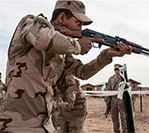POLITICAL REALITY: It is far easier and more sensible Tor the three parts of Iraq to exist separately
WITH Iraq featuring prominently in the news today, many Malaysians are asking what the future holds. How long will the internal conflicts last? Will there even be an Iraq in the future?
Forecasts of any kind are; at best, fraught with uncertainties. When applied to Iraq, where the situation is literally changing by the hour, any argument can quickly become obsolete.
As a former native of the country, I offer my perspective on the question of how Iraqi politics work today and how that, in turn, defines how it will work in the future.
It has been more than 12 years since the United States invasion of Iraq and overthrow of Saddam Hussein. Little has changed for the better and much has changed for the worse.
In Anderson and Stansfield’s 2005 book, The Future of Iraq, they argued that even a significant American presence will not stabilise Iraq because it is an artificial state. Its people have never shared a common identity.
In addition, the legacy of Saddam’s tyrannical rule and the primacy of political violence had eroded social bonds and entrenched tribal allegiances. This provided fallow ground for democracy.
Iraq is now moving towards a de facto partition of three regions.
One comprises Baghdad and the Shia south, predominantly under Iranian influence.
A second is a central Sunni region, large parts of which are currently ruled by militants of the Islamic State (IS).
Third is the now expanded Kurdish region in the north, complete with Kirkuk and pockets of Nineveh and Diyala provinces.
In the period since Saddam’s fall, the Kurds have maintained their autonomy in the north of the country, watching the chaotic events in the south unfold with an increasing degree of concern. The north is now economically booming, even more than it was during the 1990s. Property developers have been moving into the region, encouraged by the Kurdish authorities.
Under Saddam, Iraqi Shias once dreamt of ruling a nation stretching from the Persian Gulf in the south up to the Syrian Desert and the mountainous north. It is clear, however, that they will end up with a much smaller state, effectively ruled by Teheran.
It will not be any better for the Sunnis unless they drive IS militants out and find ways to self-administer the region, which is rich in oil and natural gas reserves.
While not inevitable, we are seeing this scenario unfold before our eyes. The point has been reached where it is far easier and more sensible to consider the three different parts of Iraq existing separately rather than it is to imagine them magically coming back together.
It must be said the Kurds have benefited from the chaos resulting from the incursion by IS fighters into the north. They realised their long-time dream of taking control of Kirkuk and other disputed areas. If IS militants remain on the borders of their self-ruled region, there will not be any peace.
Many in Iraq have long viewed the Kurds as opportunists and dispute their claim to what they see as Arab territory. It is difficult to see, however, how an Arab-dominated central government will be able to deny the Kurds what they already have.
Pressures for partition have been building for some time and former Prime Minister, Nouri al-Maliki, a Shia, is mainly to blame.
Instead of healing the sectarian rifts in Iraqi politics and building a culture of democracy and federalism in his first term, he avoided -having an open and inclusive approach to all political factions and a national government that abided by the rule of law.
The Iraq of today is neither new nor democratic. There is no implicit consensus on the legitimacy of the underlying order. For democracy to succeed, there needs to be a political order characterised by pluralism, cultural tolerance and a degree of regional autonomy.
This, Iraq does not, and has never, enjoyed. Therefore, Iraq will remain a state without being a nation. The wounds and hatred that divide the country will be very difficult to overcome.
In my view, Iraq’s immediate future will continue to suffer from political instability and move towards a de facto partition into three regions.
Article by Dr Abdul Wahed Jalal Nori which appeared in New Straits Times, 24 February 2015.





